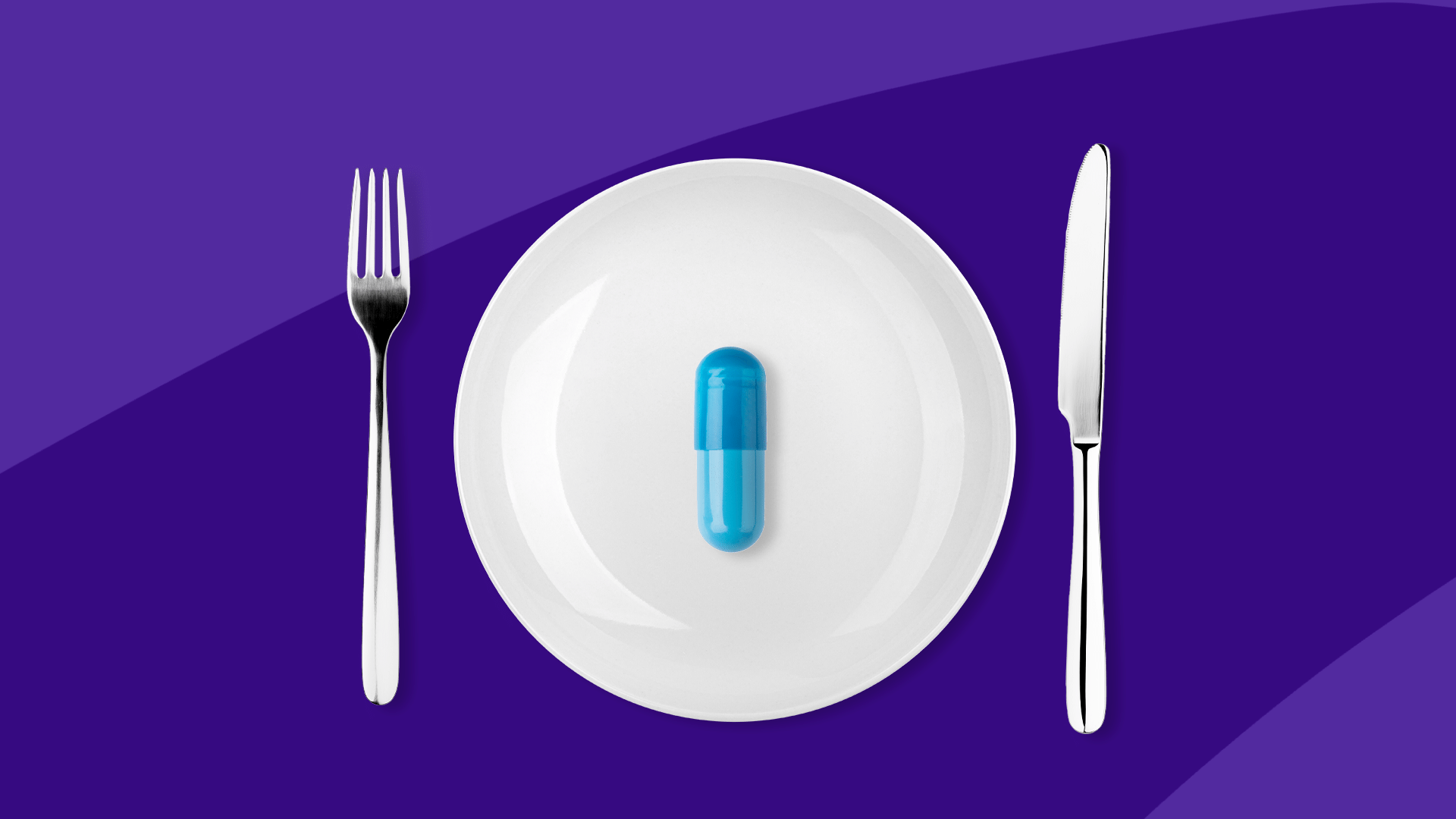FDA-approved weight loss pills | Phentermine | Qsymia | Saxenda | Contrave | Plenity | Orlistat | Wegovy | Safety information | What’s the best weight-loss pill?
Just over 42% of adult Americans are obese (defined by having a body mass index over 30)—and that number is expected to grow to 50% by 2030. Because of the myriad health conditions that all those extra pounds can cause, many are wondering: Can losing weight be as simple as taking a pill?
Prescription weight-loss pills aren’t a magic bullet. But when used in conjunction with a healthy diet, restricting calorie intake, and exercise, they can help some people on their weight loss journey. On average, after one year of use, people taking prescription weight-loss medication lose 3% to 12% more body weight than people who use diet and exercise alone. This may not sound that impressive, but that difference can be enough to help reduce your risk of heart attack, stroke, and diabetes
“We live in what we now call an obesogenic environment,” says Juliana Simonetti, MD, co- director of the Comprehensive Weight Management Program at the University of Utah. “Physiologically speaking, we’re built to hold on to calories so we can survive things like famine and war. We also eat many calorie-dense foods and have 24/7 access to food. All these things promote weight gain. Weight-loss medications can help us overcome some of that physiology and control our appetites so we can lose weight.”
So, what are the best weight loss pills out there? Read on to find out.
7 FDA-approved weight-loss pills
Prescription medications for weight loss work in different ways. Some work by targeting areas of the brain that regulate appetite. By altering certain brain chemicals, these drugs act as an appetite suppressant and/or increase feelings of fullness. Some drugs use a different pathway, helping to interfere with your body’s absorption of fat. Because obesity can be a chronic health issue, many of these drugs are meant to be used long term, even after you reach your ideal weight—assuming you’re responding to the medication in the first place.
“A common analogy is blood pressure medication,” says Aleem Kanji, MD, a board-certified endocrinologist and obesity medicine specialist with Ethos Endocrinology in Houston, Texas. “Most would expect high blood pressure to return if medication is discontinued. Obesity is the same. It is a chronic disease that requires chronic therapy.”
But not everyone is a candidate for weight-loss drugs. Use of prescription weight-loss medications is typically reserved for people who:
- Have a BMI (body mass index) of 27 or greater with the presence of a weight-related disease or complication—for example, Type 2 diabetes, high cholesterol, or high blood pressure
- Have a BMI of 30 or greater
A BMI of 25-30 puts a person in the overweight category. A BMI over 30 is considered obese. Your primary care physician can prescribe a weight-loss medication, as can an obesity medicine doctor or endocrinologist, who treats weight-related health conditions like diabetes. Currently, there are only a handful of weight-loss medications approved by the Food and Drug Administration (FDA). The most commonly used ones include the following.
1. Lomaira, Adipex (phentermine)
Phentermine is the most commonly prescribed weight-loss medication used in this country. It helps suppress appetite and make you feel fuller for longer. Phentermine is an amphetamine-like stimulant drug that can affect your heart. As such, it’s generally used for the short term (usually 12 weeks at a time).
Side effects can run the gamut and may include:
- Shortness of breath
- Chest pain
- Increased blood pressure
- Increased heart rate/pounding heart
- Restlessness/problems sleeping
- Dry mouth
- Dizziness
- Changes in mood
- Itchiness
In one study looking at nearly 800 people with BMIs of over 25, 45.6% of people were able to lose 5% or more of their starting body weight after 12 weeks of phentermine use.
According to the drug’s FDA prescription information, certain people should not use the drug, including:
- Those with cardiovascular disease (including uncontrolled high blood pressure and heart arrythmias)
- People who have taken a monoamine oxidase inhibitor (MAOI—a type of drug that’s sometimes used to treat depression) within 14 days
- Pregnant or nursing women
- People with glaucoma
- Those with an overactive thyroid
- People who have mood disorders, especially manic/depressive moods or agitation
2. Qsymia (phentermine/topiramate)
Qsymia combines a low dose of phentermine with topiramate, a drug used to treat seizures and migraines. “The phentermine helps suppress appetite and the topiramate appears to reduce cravings,” says Dr. Simonetti. “Because we use a low dose of phentermine, Qsymia can be used over a long period of time and typically produces good results.”
Qsymia comes in a variety of dosages.
- For the first two weeks, your provider will prescribe a dose of 3.75/23 mg (3.75 mg of phentermine, 23 mg of topiramate) taken in capsule form once a day.
- Starting in week three, you’ll be prescribed a 7.5/46 mg capsule. If you’ve lost at least 3% of your overall body weight by the end of 12 weeks, you’ll stay on this dose indefinitely.
- If not, your healthcare provider may up the dose to a maximum of 15/92 mg.
Qsymia may cause some of the same side effects as other medications containing phentermine, as well as possible additional side effects due to the topiramate. One of the biggest dangers of Qsymia is its link to birth defects. It’s imperative that you talk to your doctor about preventing pregnancy if you want to try Qsymia and to take monthly pregnancy tests if you’re at risk for pregnancy. And while Qsymia can have other serious side effects, including suicidal thoughts, increased irritability, worsening depression/anxiety and heart and eye problems, the most common ones include:
- Tingling or numbness in hands, feet, arms, and face
- Dry mouth
- Constipation
- Trouble sleeping
- Dizziness
- Changes in the way food tastes
Research shows that Qsymia can help people lose weight, even at low doses (although the higher doses produce more weight loss). In one study, people who took the average dose of Qsymia (7.5/46 mg) lost 7.8% of their body weight and those taking the highest dose (15/92 mg) lost nearly 10%.
Qsymia may not be right for certain groups of people, including:
- Pregnant/nursing women or women trying to conceive
- People with cardiovascular problems
- Those with glaucoma
- People who drink heavily
- People with an anxiety disorder
- Those with uncontrolled hyperthyroidism (an overactive thyroid)
- Those with prior issues of kidney stones
- People who have taken an MAOI within 14 days
3. Saxenda (liraglutide)
The active ingredient in Saxenda is a glucagon-like peptide-1 (GLP-1) receptor agonist, a class of drugs used to treat Type 2 diabetes and keep blood sugar levels in check. GLP-1 is a hormone your body naturally makes that’s released in response to food and helps regulate your appetite. Saxenda mimics the action of GLP-1 in your body, but it lasts much longer than naturally occurring GLP-1. As such, it can help suppress hunger longer and slow the movement of food emptying from your stomach. Both factors can help you eat less overall and lose weight.
“I have patients tell me that they never left food on their plates before, but with Saxenda, they’re eating less and getting full quickly,” comments Dr. Simonetti. In late 2020, Saxenda was approved for use in adolescents.
Saxenda is a daily injectable with dosing increasing from 0.6 mg in week one to 3.0 mg by week five. While Saxenda can cause some serious side effects, such as inflammation of the pancreas (called pancreatitis), gallbladder problems, and mood changes, the most common side effects include:
- Nausea
- Diarrhea
- Constipation
- Vomiting
- Low blood sugar (hypoglycemia)
- Headache
- Dizziness
- Tiredness
- Stomach pain
A study following more than 500 people found that 50.5% of those taking liraglutide were able to lose at least 5% of their body weight during the study period versus 21.8% who took a placebo. Even more impressive, 26.1% of the drug group were able to lose 10% of their body weight compared to just 6.3% in the placebo group.
Saxenda carries a black box warning (the FDA’s strongest alert to consumers and healthcare providers about very serious side effects) due to the fact that animal studies have linked liraglutide and medicines like it to certain thyroid tumors and thyroid cancer. It’s important that you not use Saxenda if you have had these conditions or have a family history of them. Saxenda isn’t appropriate for pregnant or nursing women. Talk to your healthcare provider if you’re taking medicines that act like GLP-1 receptor agonists. Because Saxenda can slow stomach emptying, it’s also important to ask your doctor how that may affect other prescription and over-the-counter medicines you take.
4. Contrave (naltrexone and bupropion)
Contrave combines naltrexone (used to treat substance abuse) and bupropion (an antidepressant that’s marketed under the brand name Wellbutrin). It’s thought to work on the brain to regulate appetite and cravings.
Like a lot of weight-loss medications, your dose of Contrave will start out low and increase over time.
- Week one: One pill in the morning.
- Week two: Two pills, one in the morning and the other at night.
- Week three: Two pills in the morning and one in the evening.
- Week four and beyond: Four pills per day—two in the morning, two in the evening
Contrave can potentially produce serious side effects, such as suicidal thoughts and seizures, but the most common side effects are:
- Nausea
- Constipation
- Headache
- Vomiting
- Dizziness
- Trouble sleeping
- Dry mouth
- Diarrhea
One study examined how Contrave contributed to weight loss when used in conjunction with behavior therapy (sessions with registered dietitians, exercise specialists, and psychologists). Compared to those receiving a placebo and therapy, 1.5 times as many people in the Contrave/therapy group were able to lose at least 5% of their body weight compared to those in the placebo group.
Contrave should not be used in people who:
- Have uncontrolled hypertension
- Have seizures
- Are pregnant
- Use other drugs containing bupropion
- Are withdrawing from alcohol and certain other drugs
- Have used an MAOI within 14 days
5. Plenity
Plenity is technically a medical device, not a medication. It’s a capsule that contains superabsorbent hydrogel particles. When the capsule is swallowed, the particles are released, helping to fill up to one fourth of the stomach (when a person is fully hydrated). With the stomach at least partially full, you’re apt to eat less.
You take three Plenity capsules with 16 ounces of water before lunch and dinner. The particles absorb the water and mix with the food in your stomach, helping you feel fuller so you eat less.
The most common side effects are:
- Bloating
- Abdominal pain
- Flatulence
One study showed that 59% of those taking Plenity lost 5% or more of their body weight and 27% lost more than 10% of their weight. That’s compared to 42% and 15%, respectively, in the placebo group.
Plenity is not approved for use in those under the age of 22. You also shouldn’t take it if you’re allergic to citric acid, cellulose, gelatin, and other ingredients of the gel.
6. Xenical, Alli (orlistat)
Orlistat is a lipase inhibitor, meaning it blocks the enzyme that helps absorb some of the fats in the foods you eat. Meaning, less of the fat you consume makes it into fat cells to become stubborn belly fat. Orlistat comes in two different strengths—an over-the-counter 60mg strength marketed as Alli and a prescription-strength (120mg) marketed as Xenical.
Xencal is taken by mouth three times a day, with or within one hour of a meal that contains fat.
The most common side effects of Xenical are:
- Oily stools
- Gas with an oily discharge
- Loose stools
- Urgent need to have a bowel movement/unable to control bowel movement
- More frequent bowel movements
Xenical is not as effective as some other weight-loss prescriptions. One study comparing orlistat with liraglutide found that those using the latter were able to lose more than twice as much weight as those taking orlistat.
People who should not take Xenical are people who:
- Are pregnant or breastfeeding
- Have gallbladder problems
- Have food absorption issues
Xenical can affect the absorption of not just fat, but also of vitamins from the foods you eat. Make sure you talk to your healthcare provider about taking a multivitamin supplement.
7. Wegovy (semaglutide)
Wegovy is the newest FDA-approved weight-loss medication and works much the same way as Saxenda, by mimicking the action of the hormone GLP-1 to suppress hunger.
Wegovy is a once-a-week injectable. Dosage is increased over the course of several weeks-to-months, until a 2.4 mg dose is achieved.
Some of the most common side effects include:
- Nausea
- Diarrhea
- Constipation
- Vomiting
- Stomach pain
- Indigestion
- Headache
- Fatigue
- Belching/flatulence
- Low blood sugar (if you have Type 2 diabetes)
In one study, the mean change in body weight was -14.9% in the Wegovy group versus -2.4% in the placebo one. Eighty-four percent of those in the Wegovy group lost 5% or more of their body weight compared to 31.5% of those taking a placebo.
Like Saxenda, Wegovy carries a black box warning due to the possibility that it may increase your risk of certain thyroid tumors and cancer. Pancreatitis, gallbladder disease, kidney injury, low blood sugar, and other conditions have also been reported with Wegovy use.
Safety information
Prescription weight loss drugs can be effective, but they aren’t risk free. While most side effects are mild, some can be very serious and will vary based on the drug and the person using it. According to Devika Umashanker, MD, an obesity medicine specialist with Hartford HealthCare’s Medical and Surgical Weight Loss Program, some red flags that require a doctor’s attention are:
- Increased heart rate that doesn’t slow down
- Shortness of breath
- Kidney stones (symptoms include abdominal pain, back pain, and/or blood in the urine)
- Seizures
- Low blood sugar (symptoms are dizziness, feeling clammy, and increased heart rate)
- Bumps—aka nodules—around the front of your neck (this can indicate a thyroid problem)
- All-over severe stomach pain (this could signal pancreatitis)
Of course, your physician should be monitoring you while you’re on the medication, but if something is worrying you, reach out. “I tell my patients, you know your body best,” Dr. Umashanker explains. “If something feels off, give us a call.”
If you decide to stop taking the drug for any reason, speak to your doctor about how to do so safely. Quitting cold turkey can be dangerous with some of these drugs. “Contrave, for example, has to be gradually reduced,” cautions Dr. Umashanker, “to reduce the risk of seizures.”
What is the best prescription weight-loss pill for you?
And now for the million dollar question: Given the choices, which are the best diet pills based on safety and effectiveness? Turns out there’s no one best answer.
“Looking strictly at the studies, Wegovy has the highest percent of body weight loss,” Dr. Kanji notes. “However, we have to keep in mind that each study had a different patient population and method. It’s also difficult to generalize safety profiles as it should come down to each individual’s situation. For example, a person with a history of pancreatitis would want to avoid Wegovy and Saxenda but may be fine with Qsymia. On the other hand, a person with a history of kidney stones may want to avoid Qsymia.”
It’s important to remember that these drugs should be used in combination with natural weight-loss strategies, like diet and exercise, for optimal results. Some tips to help you get to a healthy weight?
- Eat high-fiber, protein-rich foods to feel more satisfied. Consider trying a low-carb, low-fat diet—or limiting your intake of processed carbohydrates (think white bread, sweets, pasta).
- Focus on making plant-based diet choices. Research shows that it can be beneficial for weight loss, and they contain lots of healthy antioxidants.
- Don’t label foods good or bad. Instead, aim to make 80% to 90% of what you eat healthy.
- Get regular exercise to burn calories, decrease body fat, boost metabolism, and increase muscle mass. Experts say you should aim for 150 minutes of moderate- intensity activity (for example, brisk walking or biking) a week.
And steer clear of any pill or herbal remedy that claims to be the best weight-loss supplement such as:
- Green coffee bean extract
- Konjac (a root)
- L-carnitine (an amino acid derivative)
- Green tea extract
- Garcinia cambogia (a fruit)
- Conjugated linoleic acid (CLA)
While these dietary supplements may claim to promote fat loss and fat burning and help you lose weight, well-conducted scientific studies don’t always bear this out. What’s more, these diet supplements are not regulated by the FDA, which means you can’t be sure of exactly what’s in them. Even natural ingredients at certain levels can be toxic to some people.
Lastly, many of these prescription medications can be prohibitively expensive, and not all are covered by insurance. Use your SingleCare card to lower costs whenever you can.











